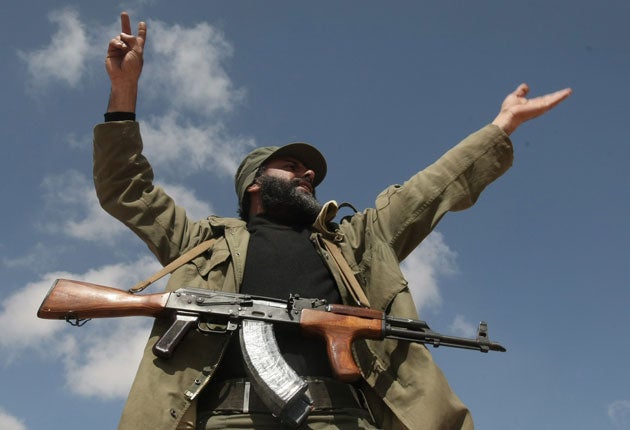Regime adopts guerrilla tactics to defy air strikes
In Ajdabiya, Kim Sengupta sees Gaddafi troops abandon tanks and form small ambush groups to wrongfoot rebels and coalition

The ambush was well co-ordinated and precise, rockets and mortar fire erupting out of the sand dunes on to the rebel convoy, destroying the main target, a truck carrying a multiple rocket launcher, and setting three other vehicles on fire. Muammar Gaddafi's soldiers had disappeared by the time Western warplanes appeared in the sky. Half a dozen charred bodies lay beside the smouldering wreckage.
Guerrilla warfare has come to Libya, not being waged, as may have been expected, by the revolutionary cadres, but by the regime, which is adapting its strategies in answer to air strikes by the international coalition. Small units have begun to traverse through the desert, far more difficult to hit than the ponderous tanks and artillery decimated in the previous 11 days.
The attack, on the road to Brega from Ajdabiya, appeared to have the desired effect. A cautious probe forward stalled amid fear of being outflanked. The rebels, the Shabaab, whose standard practice had been to charge forward on the main road west then get beaten back, were at a loss as to what to do next.
The small numbers of US and British intelligence officials and special forces believed to be in Libya may have to be augmented and their roles extended if a potent insurgency does spread through the country. Air superiority in such conflicts, as Iraq and Afghanistan had shown, would be of limited use.
The SAS has been involved in training Libyan forces before the revolution, after an agreement in 2009. Courses were conducted in counter-terrorism and surveillance at a time when Tripoli was viewed as an ally against violent Islamist militancy. Relations between the regime and the West had thawed after Gaddafi dismantled his WMD programme and extradited two suspects for trial over the Lockerbie bombing.
The only overt evidence of UK undercover forces on the ground so far came with the embarrassing arrests of troopers of the SBS who had escorted diplomats to Benghazi. Since then, British and American operatives have been calling down air strikes, trying to spot the regime's surface-to-air missiles, and liaising with officials of the provisional government in Benghazi. They are also said to be collecting information on the Islamist elements within the Shabaab and leaders such as Abdul Hakim Al-Hasidi, the head of the militia in the city of Darnah, who had spent five years in Afghanistan where he allegedly met Osama bin Laden.
Barack Obama had signed authorisation for the CIA to provide arms and other support to the rebels although the issue of supplying arms is said to be causing heated debate within the US administration. Jay Carney, the White House press spokesman, has declined to comment "on intelligence matters".
The rebel lack of counter-insurgency skills was apparent again yesterday with contradictory instructions being issued and altercations among the fighters. Ali Mohammed Bakr, a Shabaab commander, said: "We were not expecting that they would be using these tactics. We were caught by surprise. I tried to get some of our men to go in behind but the Gaddafi group spotted them and got away very fast. We do not have the vehicles or the weapons for this kind of war. But we think some foreign countries have been supplying special arms to Gaddafi, and that is the reason his soldiers can hit us without us seeing them."
An insurgency campaign can succeed, it is generally accepted, only with the help of elements of the local population. While it is true that most people in the east of the country appear to fervently back the revolution, the regime too enjoys support among communities and tribes. Local men have fought alongside the loyalist soldiers against rebels several times, and again in the town of Bin Jawad.
Subscribe to Independent Premium to bookmark this article
Want to bookmark your favourite articles and stories to read or reference later? Start your Independent Premium subscription today.

Join our commenting forum
Join thought-provoking conversations, follow other Independent readers and see their replies